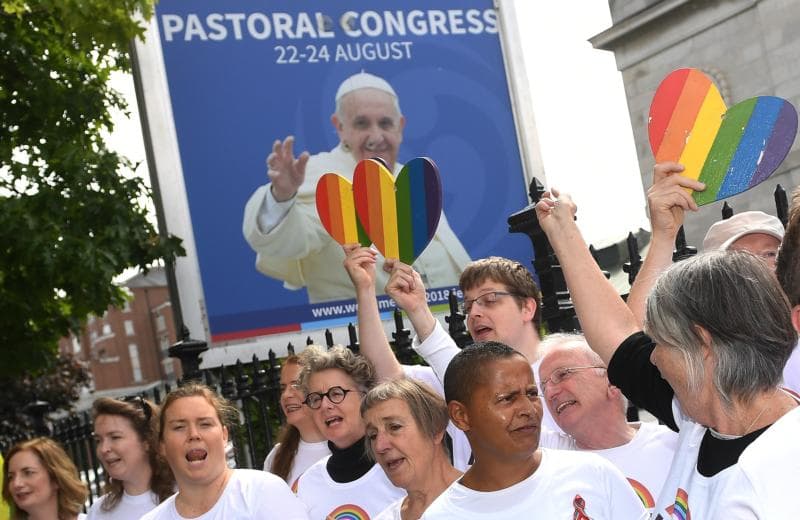This morning, Pope Francis was scheduled to be meeting with members of the LGBTQ community at the Vatican. The encounter is expected to be private, but French journalist Frédéric Martel asserted the pontiff is expected to give an “historic speech” during the event.
That claim caused sufficient media buzz that a Vatican spokesman felt compelled Thursday to “categorically deny” that the pontiff would do so.
Martel – who made waves in February with the publication of his book In the Closet of the Vatican, which reported on homosexual networks in the Vatican – added information in a March 27 blog post, claiming the pontiff would support decriminalizing homosexual acts in the countries where they are still a crime.
If that’s indeed the case, then the Vatican spokesman was perfectly right that nothing “historic” will be happening: The Vatican officially said it supported the decriminalization of homosexual acts over a decade ago, in 2008.
(Keep in mind there’s a difference between legalization and decriminalization. The latter is the removal of the penalties for something which might still be a crime. For example, jurisdictions will often decriminalize, but not legalize, prostitution and the possession of drugs.)
“The Catholic Church maintains that free sexual acts between adult persons must not be treated as crimes to be punished by civil authorities,” is how L’Osservatore Romano, the Vatican newspaper, put it in 2008.
That marked a fairly rapid evolution. Just five years earlier, then-president of the U.S. bishops, Wilton Gregory (named as the Archbishop of Washington D.C. on Thursday) took the opposite position in the wake of the 2003 Lawrence vs. Texas decision overturning anti-sodomy laws.
“Sexual activity has profound social consequences which are not limited to those immediately engaged in sexual acts. For this reason, the larger society has always shown a concern about what is and is not acceptable in sexual behavior between individuals,” Gregory said at the time.
In many ways, this volte-face was classic Vatican realpolitik, accepting the battle had been lost.
Another example would be on civil unions for same-sex couples – the Vatican’s Congregation for the Doctrine of the Faith put out an entire document explaining why Catholics must oppose the legalization of any type of homosexual union (coincidentally, also in 2003.)
Yet in a 2017 interview, Pope Francis signaled his support for civil unions for homosexuals, while insisting marriage should be between a man and a woman.
Again, this change in attitude is an acknowledgement that the facts on the ground have also changed: In 2003, only Belgium and the Netherlands had legalized same-sex marriage, and civil union laws were still being debated around Western Europe and the Americas.
Now that same-sex marriages and civil unions are recognized in large parts of the Western world, Church officials are acknowledging that mundane issues such as inheritance, medical decisions, school registrations, property ownership, etc., have to be regulated and some sort of civil partnership law can be used to do this. Some prelates have been quick to point out that these laws could also be used for other living arrangements, such as simple roommates and adult siblings sharing a house.
However, a more fundamental shift might be happening when it comes to the Church and the legal status of same-sex relationships, which is more akin to the change in attitude towards religious freedom in the mid-20th century.
The premise of a state-supported and protected Catholic Church existing in a system where “error has no rights” was struck a huge blow after the Protestant Reformation and was mortally wounded by the revolutions of the 18th and 19th centuries. The last vestiges of the ancien régime which supported the “throne and altar” model died away in the aftermath of World War I.
The suffering of non-Catholic religious people in the 20th century – such as the Jews under the Nazis, the Orthodox under the Soviets and Buddhists under Communism – caused a rethink on the Church’s part when it came to the rights of people holding “erroneous” religious opinions. This culminated in the historic Vatican II document on religious liberty, Dignitatis Humanae.
The changing landscape of the 21st century might be causing a more fundamental rethink about discussing homosexuality in the Church.
Many observers think Francis – famous for his “Who am I to judge?” – is just the pontiff to do it.
Although Francis is unlikely to deliver what the most ardent gay rights activists want, such as a Catholic blessing of gay unions, there are certain steps that would be considered positive moves by Catholics who self-identify as LGBTQ.
1) Change the wording of the catechism that describes homosexual acts as “intrinsically disordered.” Although the catechism is clear to state the problem is the act, not the person, it’s still a cause for confusion and hurt among gay Catholics and their families.
2) Announce authoritatively that people in same-sex relationships are not to be prevented from receiving normal pastoral ministry assignments, such as hospital visits by chaplains and Catholic schooling for their children.
3) State clearly that the various Church documents and papal messages that have been applied to those Catholics who are divorced and remarried also apply to those in same-sex relationships, including provisions on when it is possible to receive communion.
Whether these are good ideas is a debate for another day. Here, the point is only to sketch what a significant transition might look like.
Although these steps might not seem drastic, they would signal a shift in the Church’s centuries-long orientation when it comes to same-sex relationships, without changing Church teaching on marriage and human sexuality. It’ll be interesting to see if the needle begins to move in that direction today.






